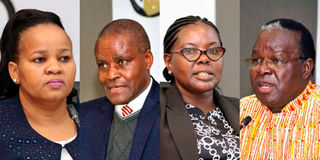Court declines to bar new IEBC commissioners from office

From left: Juliana Cherera, Francis Wanderi, Irene Masit and Justus Nyang’aya.
The High Court has declined a request to delay the four new members of the Independent Electoral and Boundaries Commission (IEBC) from taking office over allegations that their appointment contravenes the two-thirds gender rule.
In the application filed by Mr Nornael Okello seeking interim orders, the court had also been urged to stop the swearing in of the new commissioners because one of them, Irene Cherop Masiit, was approved and appointed illegally.
The others are Juliana Wihonge Chirera, Francis Mathenge Wanderi and Justice Abonyo Nyangaya.
But Justice Weldon Korir said the interim orders sought in the application were against the public interest considering that the date of the General Election is less than one year away.
The judge stated that the IEBC is limbo following a finding by the Court of Appeals that it does not have quorum to conduct its business and perform its mandate.
"Everyone knows this is the period IEBC should be properly constituted. It is in the public interest that the entity known as IEBC should be properly constituted to continue with its mandate," said the judge.
Two-thirds gender rule
On the two-thirds gender rule, the judge observed that the issue has been subject of litigation in other cases involving the membership of the Judicial Service Commission and the Supreme Court.
He directed the parties, who include the IEBC selection panel, National Assembly and Attorney General, to fast-track hearing of the petition.
Okello claims that Ms Cherop was not eligible for the job since she had presented herself for 2017 elections in Elgeyo-Marakwet County where she intended to vie for the Women Representative position. She even participated in the nominations of Jubilee Party.
He informed court that Article 88(2) of the Constitution says "A person is not eligible for appointment as a member of the commission if the person has, at any time within the preceding five years, held office, or stood for election as a member of Parliament or of a county assembly; or is a member of the governing body of a political party; or holds any State office".
He argued that allowing appointment of the four to the IEBC amounts to violation of the Constitution and abrogates Article 88(2).
However, Justice Korir ruled that should the court find Ms Cherop was ineligible and quash her appointment, the court's judgment will be sufficient remedy for her removal from office without going the tribunal way.
Mr Okello had said that if Ms Cherop takes office, her removal will be long and difficult because it requires a tribunal. He had also said without the interim orders, his petition will be rendered nugatory.
Same gender
On the issue of two-thirds gender rule, the petitioner argues that the composition of the IEBC will now have five men and two women which is against implementation of the principle that not more than two-thirds of the members of elective or appointive bodies should be of the same gender.
"The decision to forward names of two males and two females to the President for nomination was made with lack of consideration of the very essence of gender requirements that IEBC composition should comply with the two third gender rule and abrogates Article 27(6)(7) and (8) of the Constitution,” says Mr Okello.
He argues that approval of nomination of the four negated the progressive efforts made towards achieving the two thirds gender rule in public appointments. It also negated the right to equality of both men and women as guaranteed by Article 27 of the Constitution.
The petition will be heard on October 6 by way of highlighting the written submissions before Justice Anthony Mrima.





